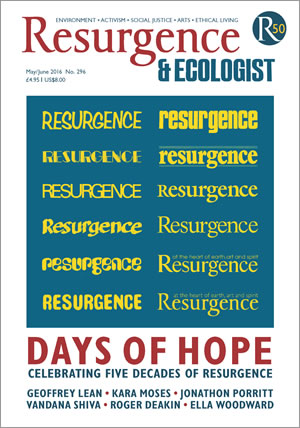EMANCIPATION
Jeremy Seabrook
Inequality has reached unparalleled levels. Those who monopolise untold resources for their private enjoyment confront people who lack enough for their sustenance. This reignites ancient questions of the distribution of resources. That inequality can be solved by ‘permanent’ economic growth is demonstrably false. Indeed, constant growth has been at the root of the problem. (As the rich get much richer the poor may become a little less poor, but the gap between them widens.) Secondly, economic expansion in perpetuity is clearly an unrealisable goal: there is no ‘perpetuity’ in human time. Yet this model is now the more or less undisputed basis for what is called ‘development’. Redefining this will be essential if there is a will to avoid the coming resource-wars: a movement of liberation, whereby what people make, give, offer, invent and provide freely for themselves and each other can be withdrawn from the ‘free’ market that holds them captive. Human development demands emancipation, not submission.
AN URBAN FUTURE?
Herbert Girardet
Most futurists take for granted that large cities will be the primary human habitat. Large modern cities are a remarkable achievement, but we forget that the fossil-fuel-powered urban revolution sweeping the planet is subject to entropy: modern cities continually degrade the resources required for their existence. Thus we face a central contradiction: humanity is building an urban future, yet urbanisation in its current form is threatening the very future of humanity and the natural world.
In developing countries, villagers who become urban dwellers typically quadruple their resource consumption, yet we barely consider how this affects the global environment. We need a global debate on these issues. Could human settlements exist and even thrive with a high degree of regional self-reliance? Could they be designed to continually regenerate the living systems on which they depend? We owe it to future generations to have answers to these existential questions.
NONVIOLENT ACTIVISM
Bill McKibben
The seeds of the 20th century are starting to flower in huge ways. Gandhi, Martin Luther King and the like experimented with this new technology: call it civil disobedience, nonviolent direct action, passive resistance. Now, in a world linked at the bottom by the internet, we’re learning how to use it against the great forces of our day: plundering corporations, totalitarian monoliths, and the technofascism that would snuff out the spark of humanity in the name of efficiency.
Game on!
CONFRONTING GLOBALISATION
Helena Norberg-Hodge
Our challenge for the coming years is to deconstruct the myths that underpin the global economy. The multiple crises we face today – climate chaos, fundamentalism, the dismantling of democracy, etc. – are the product not of human nature but of an economic system that foments greed, competition and rampant consumerism. Our governments support this system by continually handing further power to transnational banks and corporations.
But there’s good reason for hope. Around the world, people are building a movement that demonstrates a viable alternative: economic localisation. Countless small initiatives – from farmers’ markets to decentralised renewable energy to local business alliances – are proving that we can increase real prosperity while reducing our ecological footprint.
By engaging in ‘education as activism’ we can dispel the myths on which globalisation is based, and make possible the steps needed to localise economies, globally.
Another way is possible, and people are ready for change.
ENVIRONMENT
Craig Bennett
This is the century when humanity has to work out how to live fairly within environmental limits.
This would represent one of the greatest steps in the history of progress, right up there with the discovery of fire, the invention of the wheel, the development of agriculture, language, science and technology.
Over the next 50 years, people need to come together to take on the real enemies of progress: those sections of the political, corporate and media elite keeping us locked into the dirty fossil-fuelled economy of the last century, one characterised by growing inequality, environmental degradation, and unsustainable consumption.
By 2030, the next generation must enjoy an environment that’s getting better: a safer climate, flourishing Nature, healthy air, water, food.
The UK led the world with the Industrial Revolution – now we need to wean ourselves from the tyranny of fossil fuels, kick-start a green revolution and build a society fit for the challenges of the 21st century.








